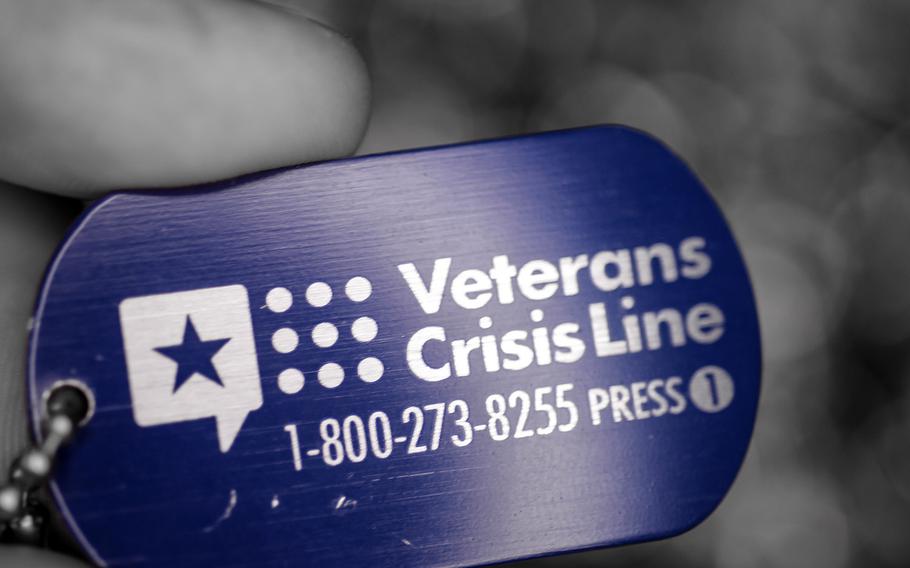
A photo illustration with the telephone number of the Veteran’s Crisis Line. (Zachary Hada/U.S. Air Force)
Every year, the U.S. Department of Veterans Affairs conducts the nation’s largest analysis of veteran suicide rates. Unfortunately, the results are chilling.
The department’s latest report found increasing veteran suicide rates. About 17 veterans commit suicide every day, a devastating figure we must address.
The report reflects the fact that veterans are 1.5 times more likely to die by suicide than the nonveteran adult population. Over four times as many veterans of the post-9/11 wars have died by suicide than by war operations.
This issue is personal to me. My son-in-law served his country honorably in two combat deployments in Iraq, including a tour I was in. Like too many veterans, he struggled with reintegrating into civilian life. Deployment changed him, and despite having a loving and supportive family, he took his own life.
No veteran family should have to go through that harrowing experience.
The VA says in its annual report that we need a whole-of-nation public health approach, including “making access as easy as possible to a continuum of evidence-based mental health treatments.”
So why is the VA contradicting its own words by reducing veteran access to mental health services?
Reports indicate that VA systems have ceased paying for veterans’ mental health care services from non-VA providers offered through community care. The VA has disrupted this essential service even though the department is congressionally required to pay for outside health care when the VA doesn’t offer the treatment, a veteran lives too far from a VA facility, or VA appointment wait times are excessive.
After being contacted by dozens of veterans about the issue, Rep. Brian Mast, R-Fla. — a veteran of Afghanistan — sent VA Secretary Denis McDonough a letter in May asking why a VA center in his district has “begun denying veterans access to their outside mental health providers.”
Twenty senators, led by Veterans’ Affairs Committee Ranking Member Jerry Moran, R-Kan., also wrote to McDonough in July about veterans who have had their community care authorizations revoked by the VA. These senators urged McDonough to reaffirm “veterans’ right to seek community care,” even amid the department’s “alleged budget shortfalls.”
Months passed since those letters, but the problem remains. In early December, a coalition of 24 veterans organizations raised the issue again with McDonough, citing recent examples of veterans being denied community care referrals and requesting that the VA end the “concerted and strategic effort” to reduce care.
Yet veterans continue to lose access to community care, subjecting them to VA waiting lists that are weeks long — all as veteran suicide rates climb.
According to the senators, the VA seems to be slashing community care in response to suggestions from a panel commissioned by the department to “assess the trends and drivers of increasing community care spending.”
They say the panel concluded that community care is “a potential existential threat” to the VA’s own medical system. Accordingly, the panel suggested the VA “save money by reducing community care referrals for veterans seeking emergency, oncology, and mental health care,” the senators write.
The senators argue that the increase in the number of reports from veterans, in addition to whistleblowers working in VA facilities, suggests that the department has adopted the panel’s suggestion wholeheartedly.
These veterans and whistleblowers say the VA has heightened scrutiny of community care referrals. Interfering with veterans’ care in this way could worsen wait times and result in veterans receiving no care altogether.
It’s appalling the VA would decide to reduce access to mental health care for veterans to address budget mismanagement at a time when the department has handed out millions in bonuses for senior executives and made over 61,000 external hires last year.
The VA’s undermining of community care for veterans is an outrage. The secretary should immediately issue a directive that reverses intentional efforts to reduce community care.
Once community care is adequately restored, the VA should also explore new ways to offer mental health support. One way would be for community care to cover sessions with certified meditation instructors who can teach veterans how to use this effective practice.
The VA’s website says Transcendental Meditation, or TM, “decreases need for anxiety and PTSD medications in active military personnel” and “reduces blood pressure as well as anxiety and stress.” But a certified TM teacher is first required to teach the technique in sessions that should be accessible through the VA.
The VA’s mission is to honor America’s veterans by providing exceptional health care that improves their health and well-being. The department is failing in that mission, but it can reverse course by protecting community care.
James “Spider” Marks is a retired U.S. Army major general.